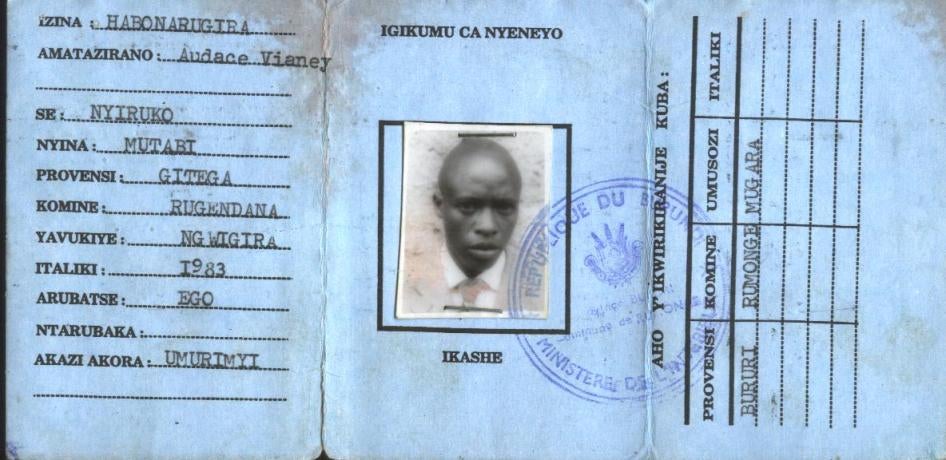In July 2011, Audace Vianney Habonarugira made his way to our office in Bujumbura, then the capital of Burundi, to talk. He was a hunted man and had taken precautions to meet us discreetly.
Habonarugira, 28, married with a two-year-old child, had joined a rebel movement as a boy and reached the rank of colonel, before leaving in 2009. He then went through the official demobilization process and retrained as a driver and mechanic.
But in 2010, politically motivated killings began to increase across Burundi after contentious elections. Habonarugira’s former group, the National Liberation Forces (Forces nationales de libération, FNL) was a main target. As a former colonel he was seen as a prime potential informer.
In early 2011, Habonarugira began receiving threats from people linked to the security forces and intelligence services, but he refused to collaborate. On March 7, a suspected intelligence officer went to his house with police officers. “Orders were given to a policeman who shot [me] … I fell and lost consciousness.” Habonarugira was hospitalized in Bujumbura for three and a half months.
We met him on July 9. He showed us extensive scars and explained how he was being hunted by the intelligence services. He knew they would not stop until they found him. But he wanted his case to be known: “You can talk about it, I am not afraid,” he told us.
On July 15, his dead body was found, alongside that of another demobilized FNL combatant and close friend of Habonarugira; both had been shot.
Political violence had reached such a peak in 2011 that the prosecutor of Bujumbura set up a commission of inquiry to investigate these types of killings. Ironically, Habonarugira testified to the commission a few days before his death.
Over the years, there was no progress in the investigation. A consortium of NGOs filed a complaint in 2014 to the African Commission on Human and Peoples’ Rights. The commission’s decision was made public this week in which they called on Burundi to carry out a thorough investigation into Habonarugira’s killing and to take measures to fight against impunity for extrajudicial executions. While this has been a long time coming, it is a welcome step in addressing impunity in Burundi.
The Commission’s decision should serve as a reminder to Burundian authorities: time may move on, but the clamor for justice will continue. The fact that political killings continue to date only underline how important it is to launch meaningful investigations and hold perpetrators accountable.
|
Dispatches
African Commission Calls for Justice in Burundi
12 Years On, a Blatant Political Killing Still Merits Meaningful Investigation
Your tax deductible gift can help stop human rights violations and save lives around the world.
Most Viewed
-
June 3, 2025
“They’re Ruining People’s Lives”

-
January 25, 2024
“We’re Dying Here”

-
April 27, 2021
A Threshold Crossed

-
November 25, 2019
A Dirty Investment

-
November 19, 2012
Losing Humanity





